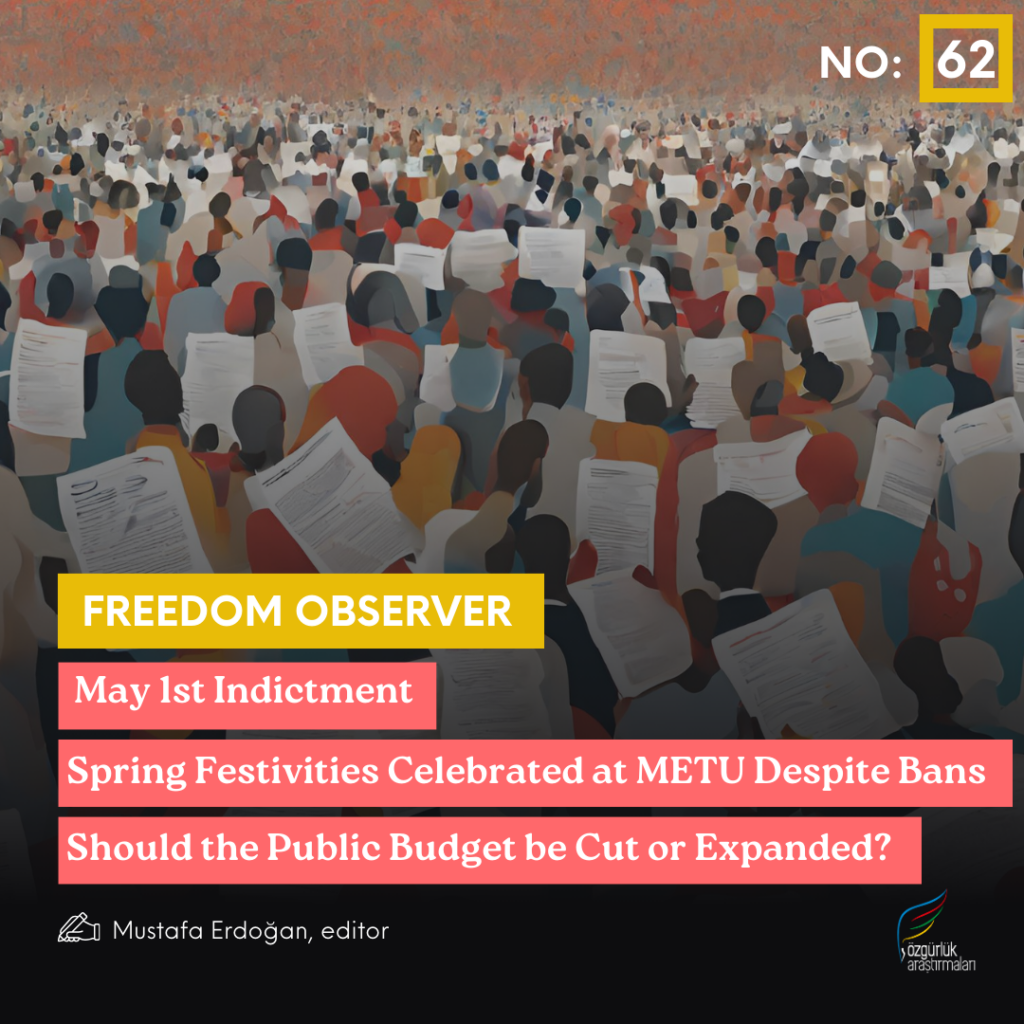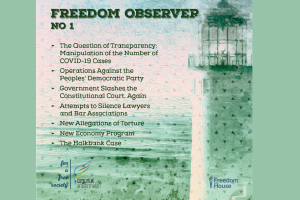
From Editor-in-Chief
Prof. Mustafa Erdoğan
There has been a noticeable slowdown in Turkish politics in recent weeks, with the country’s agenda nearly at a standstill. Efkan Ala, the Deputy Chairman of the AKP, has stated that the government is preparing a new “reform package.” However, according to news reports, these preparations seem unrelated to the country’s immediate and essential needs. Furthermore, despite substantial criticism and warnings, the government’s recent rollout of a religiously oriented curriculum in primary and secondary education is further evidence of the AKP-MHP government’s indifference to educational concerns and stark deviation from the country’s true agenda.
In good faith, it is evident what this agenda should encompass, all of which urgently require government action: liberalization of the legal system and adherence to the law, beginning with the Constitution; dismantling the autocratic regime; ceasing violations of fundamental rights; preventing political interference in the judiciary and ensuring the Court’s independence and impartiality; conducting fair trials; and revitalizing the economy, starting with reducing inflation and normalizing the Turkish Lira’s value. This last point is especially critical, as the high inflation has rendered the living conditions of a large population with fixed and limited incomes unbearable.
On the other hand, despite President Erdoğan’s statements suggesting a potential “softening” in relations between the government and the opposition, it remains uncertain when Erdoğan will respond to CHP Chairman Özgür Özel’s visit to the AKP Headquarters. Furthermore, the government’s general stance shows no signs of softening, as evidenced by the Ministry of National Education’s approach to the new curriculum. Simultaneously, while there was initial talk of easing tensions between the government and the opposition, internal conflicts within the ruling coalition emerged, notably starting with Sinan Ateş’s murder case. This escalated to the point where a “leader of a criminal organization” was explicitly named, leading to ongoing tensions highlighted by the Ayhan Bora Kaplan investigation. The sidelining of the country’s urgent issues is partly due to these underlying tensions.
Political tensions arise between governments and oppositions or across political parties and within parties themselves, particularly during periods expected to be stable. The recent developments within the CHP exemplify this. Former CHP chairman Kemal Kılıçdaroğlu, in an interview concerning the party’s upcoming constitutional convention scheduled for September, stirred internal surprise by stating, “If someone is nominated for the chairmanship at the convention, then let the brave ones step forward.” This comment indicates Kılıçdaroğlu’s potential re-entry into the leadership race. Additionally, he has accused those advocating for leadership change after the party’s presidential election loss to Tayyip Erdoğan of disloyalty. There is speculation that Kılıçdaroğlu’s remarks suggest he might attempt to transform the forthcoming “statute convention” into an elective convention, and failing that, he could consider establishing a new party. The CHP is far from settling internal disputes, with potential upheaval looming in September.
We have grown accustomed to the odd and disturbing political occurrences, but it is both surprising and disheartening to witness similar incidents within the judiciary, which undermine its dignity. A recent alarming event involved a senior judge in Izmir who was photographed with an array of weapons, including long-range firearms, displayed in his office. Adding to the concern is that some Council of Judges and Prosecutors members were present during this display. This incident raises serious questions about the propriety and judgment within the judicial community.
The judge in question was removed from his role as Chairman of the Izmir Judicial Justice Commission following an investigation into his conduct, which was deemed contrary to the “Principles of Judicial Ethics.” Particularly concerning regarding the independence of the judiciary is the judge’s response to investigators: “We answer to God, not to you.” This statement, marked by overconfidence, not only contravenes the principles of the rule of law and judicial responsibility but also implies that the judge may have significant political connections—raising serious concerns about potential biases. While it is disheartening, it is hoped that the ongoing investigation will uncover the extent of these connections and that appropriate measures will be taken, or at least possible, to address them effectively.
Recently, developments surrounding Israel’s actions in Gaza and the resultant mass casualties have seemingly placed the Turkish government in an awkward position, colloquially described as “offside.” Until recently, the Turkish government maintained trade relations with Israel, indirectly supporting the logistics of the Gaza operations. Concurrently, it prohibited its citizens from protesting against Israel’s actions. In contrast, some Western countries have taken decisive steps in response: notably, Germany is prepared to enforce the International Criminal Court’s arrest warrant against Israeli Prime Minister Netanyahu. Meanwhile, Spain, Ireland, and Norway have announced their recognition of Palestine as a sovereign state, and Slovenia is set to follow suit shortly.
In this issue, A. Rıza Çoban examines the legality of the government’s actions in light of a previous Constitutional Court decision. This analysis coincides with the indictment preparation for a case concerning the suppression of labor union demonstrations in Taksim Square on May 1 by law enforcement. In his economic commentary, Caner Gerek argues that it is vital to prioritize long-term budget balance over public expansion during this crisis period. He advocates for austerity measures and opposes any tax increases. Finally, Ömer Faruk Şen critiques the Middle East Technical University Rectorate’s decision to ban “Spring Festivals,” viewing it as indicative of the AKP-MHP government’s broader repressive stance towards universities.
May 1st Indictment
Ali Rıza Çoban, Anayasa Hukukçusu
As it is known, the government did not allow the celebration of May 1 Labor and Solidarity Day in Taksim Square this year, just as in previous years. However, last year, the Constitutional Court ruled that the categorical closure of Taksim Square to May Day celebrations was unconstitutional and found that the applicant unions’ right to organize meetings and demonstrations had been violated. (1)
The Constitutional Court recalled that “in assessing the interference with a meeting to be held at a particular venue, the Constitutional Court will take into account whether the interference was reasonable, careful, and in good faith by Article 34 of the Constitution and whether a convincing justification for the interference has been provided. It will also examine whether the interference by the public authority arises from a compelling social need and whether it is proportionate” (para. 58).
The Court explained the importance of holding May 1 celebrations in Taksim Square as follows: “Taksim Square, which is one of the building blocks of labor and trade union culture, represents not only the solidarity of those present on May 1 but also the existence of the common memory of the working people.”
In this case, every person who considers themselves a part of that culture has the right to be there on May Day to directly experience the meaning that Taksim Square expresses and to pass on their experience to future generations. Since May 1 is identified with Taksim Square, the limitation of this space leads to the restriction of the thought intended to be conveyed.” (para. 67).
Therefore, the Court accepted that a celebration in another area could not convey the same message as a celebration in Taksim Square. The decision of the administration to ban the meetings and demonstration marches, because Taksim Square was not included in the designated areas for such activities in Istanbul, was characterized as a categorical prohibition of the freedom to choose the venue. This categorical prohibition was found to be unacceptable in terms of the Constitution, considering the importance of the venue for achieving the objectives of the meeting and demonstration march.
The Court also noted that law enforcement intervened before the demonstrations started. It stated that neither the administration nor the judicial bodies had demonstrated a genuine reason for the intervention. The Court noted that in this case, the administration banned the gathering at the preferred venue without explaining the existence of a real danger that would require the absolute prohibition of assembly and demonstration marches in Taksim Square on May 1 and without considering possible measures to enable participants to hold events at the venue. It also noted that law enforcement officers intervened in groups based on the banning orders without showing any tolerance toward exercising the right in question.
This new decision of the General Assembly of the Constitutional Court was not considered by the administration despite all reminders, and the celebrations in Taksim Square were banned without any concrete threat. As mentioned in the decision, law enforcement forces intervened against individuals and groups who also wanted to march to Taksim Square this year. As a result, 42 people were arrested due to the incidents.
The Istanbul Chief Public Prosecutor’s Office issued an indictment against the 42 arrested individuals on charges of “resisting to prevent the execution of duty,” “participating in unlawful assemblies and marches without weapons and not dispersing despite a warning,” “intentional injury,” and “damaging public property.” The prosecution demanded prison sentences ranging from 3 years and nine months to 13 years and six months for the defendants. Due to the high number of defendants, two separate indictments were issued: the first charged 30 people, and the second charged 12 people. The total sentence requested for all 42 individuals amounts to 567 years. The indictment also lists 19 police officers as complainants. (2)
This indictment, which indicates that neither the administration nor the judicial authorities take into account the decisions of the Constitutional Court, casts doubt on the realism and credibility of the government’s rhetoric of détente, normalization, and reform. (3)
Spring Festivities Celebrated at METU Despite Bans
Ömer Faruk Şen, Ph.D. – Missouri University
Middle East Technical University (METU) rector Verşan Kök banned the Spring Festival, a tradition for 34 years. In response to this decision, which drew great reaction from student communities, students gathered in front of the rectorate building, chanted slogans, and demanded the decision be withdrawn. Disciplinary proceedings were initiated against the students who expressed that they would not comply with the ban, and the issue was brought to the agenda of the national public opinion. This action of METU students also received support from politicians. Political parties and MPs, especially the CHP, expressed their support for the students and said that the traditions and freedom of universities must be protected. Students sought alternative ways to organize the festivities. The rectorate banned sound and light systems from entering the campus. Fortunately, CHP MP Deniz Demir, with the assurance of his immunity, was able to get behind the wheel and bring these systems into the campus, making it possible for students to organize alternative celebrations.
First, it is essential to note that events such as spring festivals are important to university culture. Thanks to such events, students have fun, mingle, and take a breather before the tough finals week. Of course, slogans that the government does not want to hear can also be shouted during these festivities. This has also become part of the tradition over the years. For students, the campus space provides a space of relative autonomy to express their political opinions and protest against the government’s decisions. In previous years, it would have been unimaginable for banners at METU graduation ceremonies to be unfurled outside the campus. However, the fact that students were able to do this in the relative freedom provided by the graduation ceremony, even if it was not related to their graduation, led to a tendency on the part of the government to destroy the right to demonstrate and march on campuses, which had already been killed throughout the country.
Of course, we don’t know whether this decision was made solely on the rector’s initiative or if it was in line with instructions from above. Both scenarios are possible, revealing a significant problem in institutions that are supposed to be autonomous. Suppose this decision was made by the rector alone. In that case, it means he has damaged the brand and tradition of his university and tried to intimidate his students by opening an investigation. Suppose it was the rector’s own decision. In that case, it also shows why he was appointed by the President of the Republic among the three candidates proposed for rector, as he is implementing the government’s decisions that restrict rights and freedoms across the country on the campus. If Rector Kök made this decision based on instructions “from above,” there is little to discuss. It is well known from the experiences of other universities that the AKP does not want any institution to remain autonomous from its control or to maintain traditions that are “contrary” to its will. METU has experienced this pressure, similar to Boğaziçi University and Ankara University.
Finally, universities are considered the cradle of free thought and academic freedom. Academic freedom ensures that scientific research and intellectual activities can be carried out without pressure. In this context, the protest at METU is a reminder that universities should not deviate from these fundamental principles. The fact that students exercised their democratic rights to protest against the rectorate’s decision shows that universities are institutions of education and research and places where democratic values are upheld. Liberal democratic values include fundamental rights such as freedom of expression and the right to assemble. The incident at METU demonstrates that these values must be protected and defended.
The ability of students to peacefully protest against the banning of traditional festivities and express their opinions is a fundamental element of liberal democracy. Such protests are crucial for different segments of society to make their voices heard and to ensure the functioning of democratic processes. In conclusion, the protest at METU is an essential example of university freedom, academic autonomy, and liberal democratic values. Protecting the freedom of universities is vital not only for academic success but also for the survival of democratic values and the progress of society.
Should the Public Budget be Cut or Expanded?
Dr. Caner Gerek
During poor economic performance, the public budget becomes a subject of debate. In these debates, proponents of public intervention support the public budget deficit by advocating an increase in budget expenditures. They demand that the public sector should create demand and stimulate the economy. On the other hand, social expenditures emphasize unemployment and social assistance. On the other hand, free market supporters have a negative view of public expenditures and argue for a balanced budget. This debate between the parties has been back on the agenda recently. The debate was reignited in the previous weeks when the Minister of Treasury and Finance Mehmet Şimşek stated that savings in the public sector would be emphasized. This week, Minister Şimşek emphasized that new tax increases will come, and some tax increases are slowly being implemented. This week’s economic agenda is austerity and taxes.
Economic views that advocate for increased public spending during economic downturns also argue for reducing public spending when the economy recovers. In this way, the public sector plays a stabilizing role. However, it is often observed that once public expenditures increase, it becomes easier to cut them even if the economy recovers. Once public expenditures rise, there is rarely any turning back. One of the biggest misconceptions of governments is the belief that when the economy is performing well, the confidence gained from managing the economy correctly will ensure continued success in the future, and therefore, cutting expenditures is deemed unnecessary. As Carmen Reinhart puts it, the situation is different for governments, so they do not cut spending when things are going well. One of the best examples of this was the Venezuelan economy under Chavez. When oil prices were high, Chavez increased spending instead of balancing the budget by cutting public expenditures. When the situation deteriorated, he could not reduce spending, resulting in huge budget deficits.
Another risk of maintaining high public expenditures when the economy is doing poorly is the potential for shocks. In today’s world, economies face significantly more shocks and uncertainties. Exposure to political and economic shocks during periods of high budget deficits can result in a budget problem that may take many years to reverse. Therefore, it would be more appropriate for governments to maintain a public budget balance rather than running a budget deficit. The inefficiency of public expenditures is also a critical issue. The more pertinent discussion should focus on whether the budget balance will be achieved through tax increases or savings.
Savings or taxes?
When tax increases are made to balance the public budget deficit, the ratio of public debt to GDP generally increases. In other words, raising taxes to save money produces the opposite result. This is because the increase in taxes decreases the demand in the market, and since fewer transactions are realized, the tax revenues that the public sector desires to balance the budget cannot be obtained. However, when the public saves, public debt to national income decreases.
The second point is that while the effect of public savings is more permanent, the impact of tax increases is not. This is because tax increases are reactionary and aimed at stabilizing public expenditures. When tax increases are reactionary, they follow and attempt to catch up with public spending, which is not reduced and may even increase. Consequently, tax increases tend to be continuous. Continuous tax increases eventually lead to a slowdown in GDP growth. As national income decreases, the debt to national income ratio increases due to the reduction in the denominator, resulting in higher costs for future borrowing.
Regarding market reaction, cutting public spending leads to a more favorable response than tax hikes. If the market anticipates that tax increases will continue once they start, confidence in the economy will be damaged. In contrast, spending cuts and savings boost market confidence. Furthermore, if public spending cuts signal that there will be no future tax hikes, the market reacts positively.
These days, when taxes and public austerity are frequently discussed, the bottom line is that balancing the budget, rather than expanding the public sector, will produce more positive results in the long run. The economy will benefit more when the public budget balance is achieved through actual savings rather than tax increases.
1 Türkiye Devrimci İşçi Sendikaları Konfederasyonu (Disk) ve diğerleri [GK], B. No: 2016/14517, 12/10/2023). Karar metnine şuradan erişilebilir: https://kararlarbilgibankasi.anayasa.gov.tr/BB/2016/14517
2 https://bianet.org/haber/1-mayis-iddianamesi-savci-42-kisi-icin-567-yila-kadar-hapis-istedi-295918
3 https://www.aa.com.tr/tr/politika/ak-partide-yeni-reform-donemi-icin-hazirliklar-basladi/3233749





